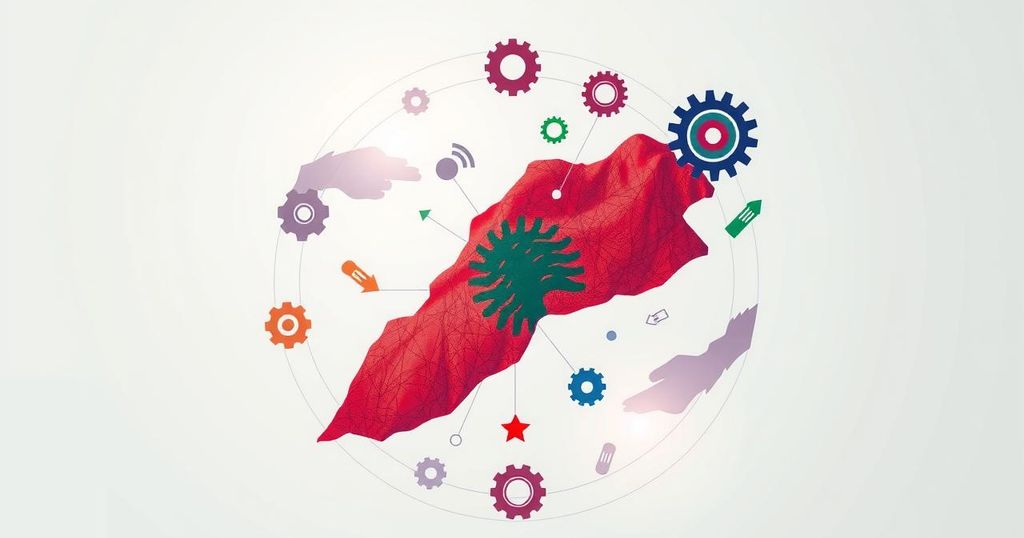Lebanon’s new political leadership presents opportunities and challenges for reform, particularly in relation to Hezbollah’s influence. Recent events highlight Hezbollah’s weakened position amid internal dissent and the loss of key allies. The new administration aims to bridge divides while addressing critical national issues, yet significant obstacles remain within Lebanon’s entrenched political system.
Lebanon has recently seen the appointment of a new president and prime minister, raising questions about the power dynamics in the country, particularly regarding Hezbollah, a dominant political and military group. Although Hezbollah remains influential, its recent setbacks – including leadership losses and diminished alliances – suggest it may be in a weakened position. The shift in governance could signal challenges ahead for Hezbollah’s political and military hegemony as the new leadership seeks to unite the nation and address pressing issues faced by the Shia community, particularly in light of the recent conflict with Israel.
Hezbollah’s backing of Joseph Aoun’s presidential candidacy reflects a tactical approach amidst their concerns of losing substantial political clout. However, following Nawaf Salam’s ascent to prime minister-designate, Hezbollah abstained from providing support, indicating internal divisions and external pressures. Hezbollah MP Mohammad Raad’s remarks reflect a broader sentiment within the group that they feel marginalized by new governance structures, which may seek to question their historically unchallenged authority.
Both Aoun and Salam have articulated ambitions for national unity and sovereign governance, including efforts to ensure that Hezbollah’s military influence diminishes while emphasizing the state’s monopoly on arms. Hezbollah now faces fresh challenges, as prior regional support has declined with the fall of the Assad regime in Syria. The group has previously resisted any encroachments on their military capabilities, yet the current political landscape necessitates negotiation in order to address the pressing needs of constituencies affected by Israeli operations.
One of the critical aspects of Salam’s leadership is the potential for reconstruction and reconciling with the Shia community post-conflict. Analysts posit that, in order to engage with international aid effectively, Hezbollah must adapt to a changing political environment, which might entail a temporary acceptance of new norms within Lebanese governance. Salam’s inclusive approach seeks to integrate Shia interests within national conversations, a move seen as necessary for broader legitimacy.
Amidst these developments, the Lebanese political scenario remains complicated and fraught with challenges. The need for significant structural reforms remains urgent, as entrenched power dynamics continue to dominate governance. Skepticism persists regarding the ability to implement reforms amid a system characterized by sectarianism and patronage.
The subsequent pressures on Hezbollah and the political class suggest a unique, albeit challenging, opportunity for change. Should Salam and Aoun successfully navigate the intricacies of Lebanese politics, there exists a possibility for greater political stability and dialogue aimed at addressing Lebanon’s multifaceted crises. Nevertheless, experts caution that the deeply rooted political class may resist such transformations, posing further uncertainty for future governance in the country.
Lebanon’s political landscape has long been dominated by groups such as Hezbollah, which has wielded considerable military and political influence for decades. Recent developments, including leadership changes, provide context for assessing Hezbollah’s standing. The backdrop of regional conflicts and domestic pressures amplifies the urgency for reforms and more balanced governance. The new leadership under Joseph Aoun and Nawaf Salam aims to address national issues, exacerbated by past governance failures, that could reshape the trajectory of the country.
In conclusion, Lebanon is at a pivotal juncture with new leadership that presents both challenges and opportunities for reform. Hezbollah’s historical dominance faces scrutiny as the necessity for a unified national agenda comes to the forefront. With the potential for reconstruction efforts and international cooperation, there is a cautious optimism for change; however, the entrenched political system poses significant barriers to meaningful reform and stability. The overarching question remains whether the current administration can surmount the deep-rooted challenges confronting Lebanon today.
Original Source: www.aljazeera.com






